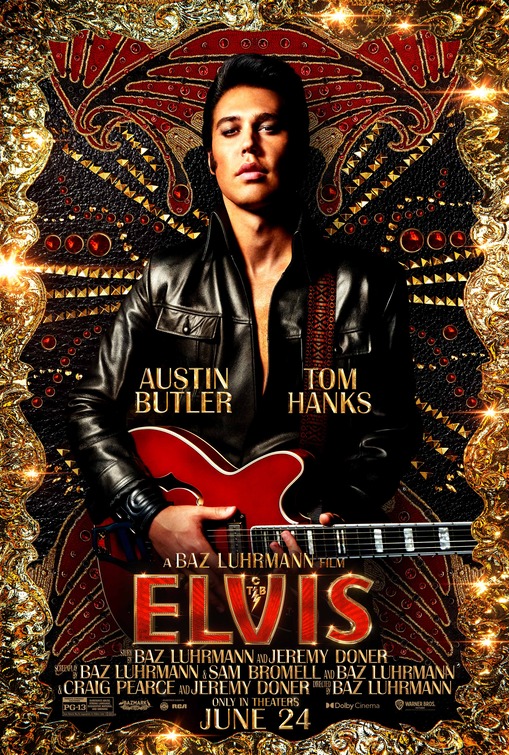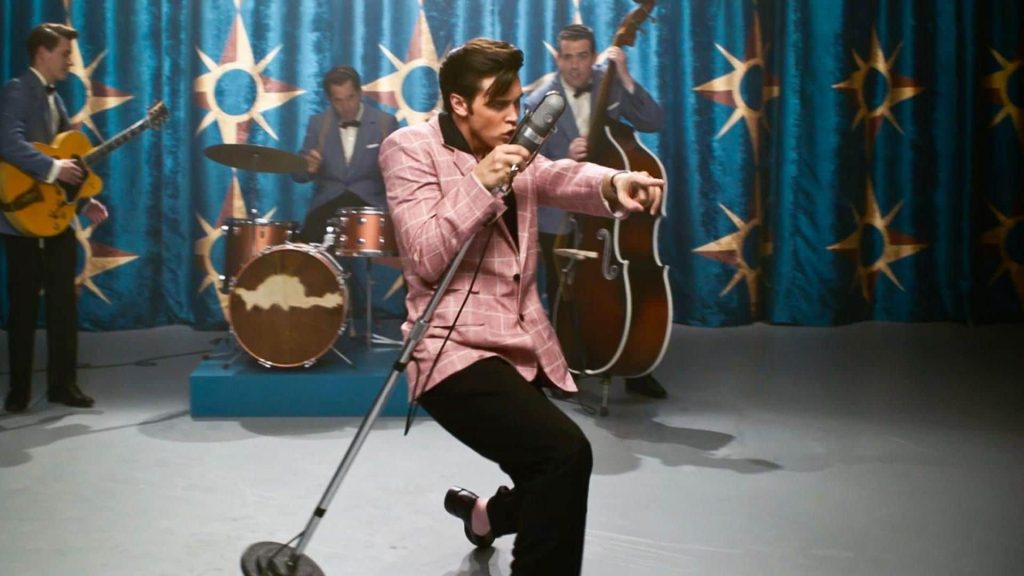
On a superficial level, the latest account of the King of Rock and Roll could be considered a biopic. It covers 42 years through his death in 1977. However, it does much more than simply detail the dramatic beats of a life. It captures the feeling of a performer. Think of it as an ode to a cultural icon. This is Baz Luhrmann’s joyous celebration of the best-selling solo music artist of all time.
If you’re familiar with the work of Baz Luhrmann, you know the director can be a little frantic and over the top. The Great Gatsby, Australia, and Moulin Rouge weren’t known for their subtlety. Here his manic style has been carefully manipulated and applied perfectly. You can feel the director’s enthusiasm for this entertainer. I will admit the narrative is a bit chaotic. The chronicle is edited like a trailer as events transpire rapid-fire. A whirlwind of developments are thrown at the viewer. The presentation has all the giddy excitement of a fan who can’t wait to extol the virtues of their favorite star. You can barely catch your breath before another happening occurs.
The events aren’t in chronological order either. We begin in 1997 with the death of Elvis Presley’s manager, Colonel Tom Parker. He is our narrator. “I didn’t kill him. I made him,” he declares. We jump to Las Vegas in the 1970s, at the International Hotel where Elvis is headlining. Things aren’t going so well for the rock star as he can barely stand. Then we leap yet again to the mid-1950s at a carnival where Jimmie Rodgers (Kodi-Smit McPhee) is holding a record and singing the praises of a new artist. The frenetic account bounces around details served up in a flashy presentation befitting the legend himself. I admit I had to find my footing, but I grooved into the rhythm of the story. It’s like randomly dropping the needle on various cuts of a greatest hits album in cinematic form with one spectacular scene after another.
Major credit goes to Austin Butler in the title role. The musical numbers in front of a crowd are where he comes alive. The young actor channels the vocalist so perfectly that I did not view his triumph as a mere actor playing a part but as the genuine article. At one point, Elvis performs while gyrating his hips in front of an audience for a TV program. He whips half the throng into a frenzy, and the other half blankly stare, mouths agape in shock. You completely understand at this moment why Elvis was so charismatic and yet so dangerous to the social norms of the day. It’s a mesmerizing depiction. There have been memorable efforts in the past. Kurt Russell in the 1979 film Elvis and the 2005 CBS miniseries starring Jonathan Rhys Meyers come to mind, but Butler’s portrayal surpasses them all.
It is an odd irony when the same production can boast both the best and worst performances of the year. As revelatory as Austin Butler is in the title role, Tom Hanks is woefully miscast as Colonel Tom Parker. Underneath pounds of makeup and grotesque prosthetics that include a fat suit, the actor slinks and sneers his way through the picture in a manner so misguided it threatens to derail every scene in which he appears. A Bond film affords the villain more nuance. Early on when Parker realizes that Elvis is not a black man, the camera zooms into a close-up so he can incredulously proclaim, “He’s…… white?!” Hanks is so bad it blights this assessment from being a 5-star review. It is an absolute testament to the glory of Austin Butler’s achievement that he seizes focus.
Elvis is a kaleidoscopic extravaganza that taps into the energy that was Elvis. It won’t be easy to assemble an order to his discography as it’s bestowed here. It’s a celebratory feeling to what the man meant more than the sequential facts of what he did. The collage of melodies includes Austin Butler singing Elvis’ early tunes, lip-syncing to the real deal in his later output, and a pastiche of songs sung by other artists swirling in the background. The screenplay frequently touches upon the musician’s reverence for inspirations like B.B. King (Kelvin Harrison), Little Richard (Alton Mason), and “Big Mama” Thornton (Shonka Dukureh). The exhibition is dazzling for both its sweep and depth. There is so much to take in this emotionally exhilarating spectacle. It is breathtaking. Movies that often stretch past 2 hours rarely need to be. This film is 2 hours and 39 minutes. When it was all over, I wanted more.
06-23-22


4 Responses
I’ve been in the thrall of Baz Luhrman since Strictly Ballroom. His over-the-top style and flamboyant flair are reasons why we still need to see movies (not dependent on action/adventure or militaristic histrionics) on the big screen. I have tickets to see this tomorrow and I can’t wait.
You’re so right. The spectacle is simply amazing up on a big screen. As a fan of Baz Luhrmann I suspect you’re really going to enjoy this a lot. I can’t wait to hear your take.
I did not know who this Austin Butler guy was before this movie. I only know him as Elvis. That’s how convincing he was. I really enjoyed this a lot! There were a few added modern music entries I didn’t like, and also, I thought Tom Hanks was miscast. But those minor flaws didn’t take away from my enjoyment at all. I will see this again. 4 ⭐️
I’ve looked into his career and he apparently started as a child acting on television including recurring parts on The CW’s Life Unexpected (2010–2011) and Switched at Birth (2011–2012). He gained recognition in the mid-2010s for starring in The Carrie Diaries (2013–2014) and The Shannara Chronicles (2016–2017). I’ve never seen any of those things.
He did have a small part as one of the members of the “Manson Family” in Quentin Tarantino’s Once Upon a Time in Hollywood.